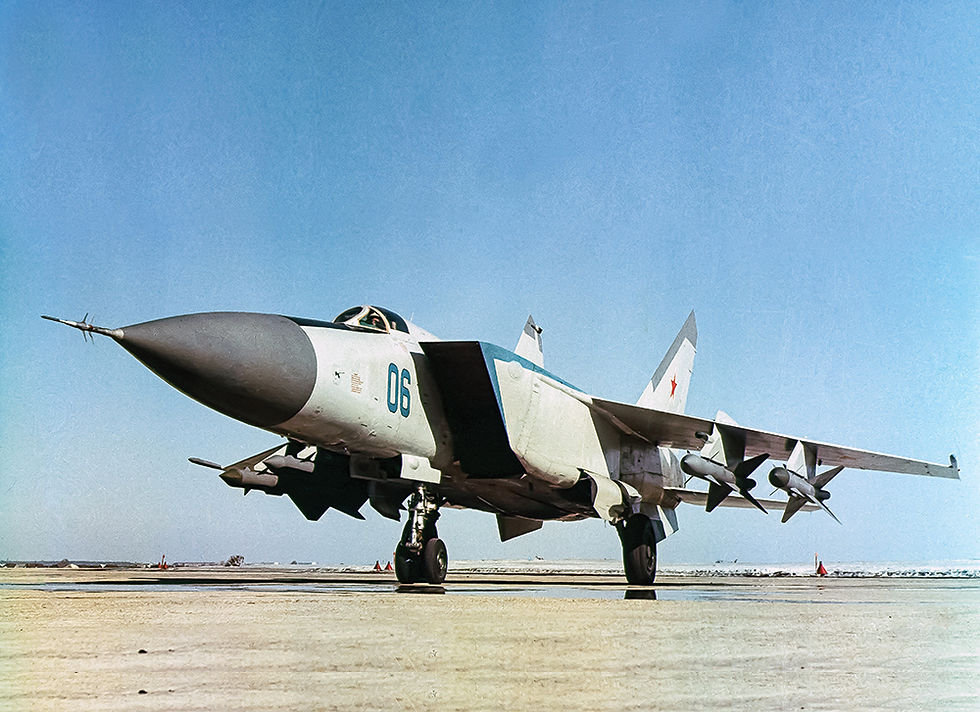The Foxbat Flies West: Viktor Belenko's Daring Defection and the Cold War
- thiliwriting
- Mar 6, 2024
- 3 min read
On a crisp September morning in 1976, the iron curtain of the Cold War twitched. Lieutenant Viktor Belenko, a Soviet pilot stationed in the Far East, took to the skies not to patrol his airspace, but to defect. His weapon? Not a missile or a bomb, but the most advanced Soviet fighter jet of the time, the MiG-25 "Foxbat." His target? Not an enemy airbase, but Hakodate Airport in Hokkaido, Japan - the West.
Belenko's defection wasn't just a dramatic escape; it was an intelligence coup for the West and a major blow to Soviet prestige. This event, forever etched in Cold War history, serves as a microcosm of the ideological struggle, technological anxieties, and human desperation that defined the era.
A Pilot Disillusioned:
Born in 1947, Belenko grew up in the Soviet Union, a nation both proud and paranoid in the face of the ongoing Cold War. He excelled in academics and eventually joined the prestigious Soviet Air Force, becoming a pilot of the MiG-25 - a plane shrouded in secrecy and believed to be technologically superior to anything the West possessed.
However, disillusionment soon set in. Belenko, according to his accounts, grew increasingly dissatisfied with the Soviet regime. He witnessed the stark contrast between the state's propaganda and the daily struggles of ordinary citizens. The economic stagnation, political repression, and limited opportunities fueled his desire for a different life, a life he believed existed in the West.
The Daring Escape:
On September 6, 1976, Belenko saw his chance. He was scheduled for a routine training mission near the Japanese border. Armed with a rudimentary map and fueled by his yearning for freedom, Belenko made a split-second decision. He veered off course, pushing the MiG-25 to its limits and ignoring warnings from ground control.
The journey was fraught with danger. Low on fuel and unsure of his reception, Belenko prepared for the worst. He landed the sophisticated fighter jet at Hakodate Airport, narrowly avoiding a civilian airliner on the runway. The unexpected arrival of a Soviet aircraft sent Japan into a frenzy, creating a diplomatic headache.
A Windfall for the West:
Belenko's defection was a goldmine for Western intelligence agencies. The MiG-25, long shrouded in mystery, was now in their hands. American and Japanese specialists meticulously examined the aircraft, discovering that while formidable, it wasn't the invincible super weapon the Soviets had projected. Its radar capabilities were less advanced than expected, and the materials used were not revolutionary as initially feared.
This revelation was a strategic game-changer. It alleviated Western anxieties about the Soviet air threat, allowing them to adjust their military strategies. However, the defection also exposed the limitations of Western intelligence gathering, highlighting the effectiveness of Soviet secrecy surrounding their military technology.
The Price of Freedom:
Belenko's life took a dramatic turn. Granted asylum in the United States, he faced public scrutiny and accusations of being a Soviet spy. The Soviet Union, predictably, branded him a traitor, subjecting his family back home to persecution and ostracization.
Despite the challenges, Belenko built a new life in the West. He became a U.S. citizen, worked as an aerospace engineer, and even wrote a book about his experiences. However, the shadow of his defection remained. He lived in constant fear of Soviet retribution, a constant reminder of the sacrifices made in his pursuit of freedom.
A Legacy of Defiance:
Viktor Belenko's defection serves as a reminder of the human element often overlooked in the grand narratives of historical events. It wasn't just about technology or international politics; it was about an individual defying a repressive system in search of a better life.
His story also highlights the complexities of the Cold War, where the lines between espionage, ideology, and personal aspirations blurred. The defection served as a turning point, offering valuable insights into Soviet capabilities and anxieties while simultaneously illuminating the human cost of ideological conflict.
The tale of the "Foxbat's" westward flight echoes through the halls of Cold War history, forever etched as a testament to both the technological anxieties and the enduring human desire for freedom.




Comments